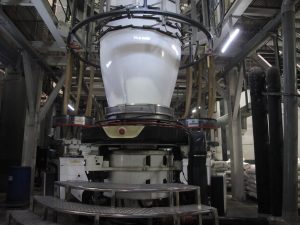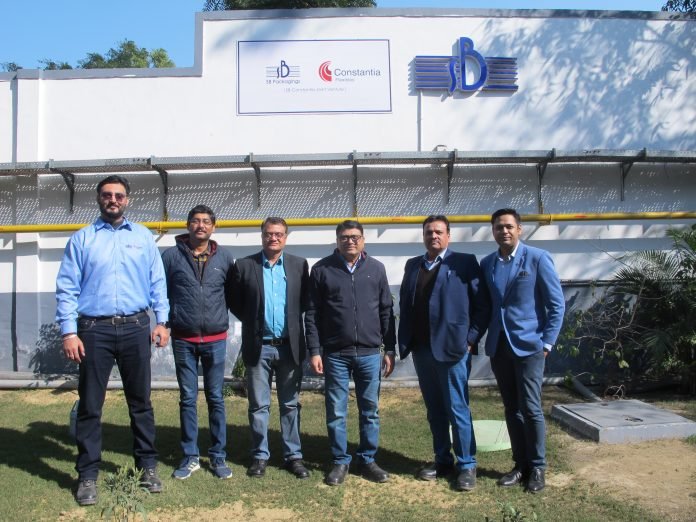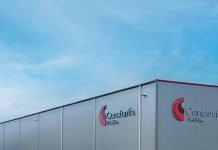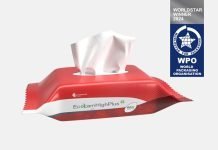It’s nearly a year since the initiation of SB Packaging’s joint venture with Constantia Flexibles in April 2023, which brought the eight erstwhile Constantia plants in India under a single umbrella together with the SB plant in Sampla. Aayush Pandey reports on his visit to what can be called the mother plant of the group.
Apart from the SB Packaging Sampla plant, the multi-location SB-Constantia Group includes eight production plants within India — two in Ahmedabad, and one each in Baddi, Hyderabad, Pondicherry, Kolkata, and Guwahati, delivering around five crore (50 million) poly bags for hygiene products close to its customers in all parts of the country. Under the new corporate structure of the SB-Constantia Group, the management is now based in Mumbai, with Deepak Ganjoo as the CEO and Marzban Thanewala as the company’s CMO.
On an early winter morning, we visited SB Packaging’s plant on the outskirts of Sampla, about an hour’s drive from Delhi. The surroundings are now populated by several amenities and as one enters, one sees the in-plant ATM right at the gate. The forward-looking plant utilizes solar energy for more than 20% of its production while its strong female workforce comprises more than 10% of its resources.
Established in 1991, the plant produces special poly bags and pouches for the hygiene, retail, and food and beverage industries. Nitin Narkhede, the plant’s chief operating officer, said that a large part of the plant’s packaging production is dedicated to the hygiene segment for sanitary napkins, diapers, shaving kits, tissue papers, and toilet rolls. The rest is aimed at the food and beverage segments, including dry fruit, premixes, breakfast cereals, instant food, and shrink labels for bottles and cans.
According to Narkhede, the flexible packaging market for hygiene has recently slowed down a bit. He says, “The hygiene packaging segment was booming during the pandemic years, post-pandemic the market has slowed down for packaging providers and brand owners. Our shrink labels for water bottles and carbonated beverages have been slower too due to seasonal demand. But the market has picked up momentum since December.”
“We have heavily leveraged technology,” adds Antriksh Agrawal, general manager of sales. Speaking about the plant’s modernization in the past three years, he adds, “For blown film extrusion, we have the Varex II blown film lines from Windmoller and Holscher and for flexo and gravure printing, we have presses from W&H, Bobst, Uteco and Kohli. Our converting machines are from Nordmeccania and SP Ultraflex.
“Since we specialize in hygiene packaging at this special-purpose plant, the employees strictly adhere to several hygiene and safety protocols. Entry into the plant is not allowed without going through the air decontamination chamber.”
Our walk-through of the Sampla plant starts from the W&H Varex extrusion and blown film lines with their own roof, towering above the rest of the plant. Capturing a picture of the whole machine is only possible after several retreats. “We have four more,” Agrawal says jokingly.

It’s fascinating to watch a blown film line work. Resins fed by the extruders are melted and blown through the die and a huge bubble or tube rises toward the roof. The bubble is slit and wound into rolls for subsequent printing and converting processes. Automation plays a huge part in the entire extrusion process for maintaining the stability of the bubble and the consistency of the film parameters. Repeatability and wastage of resin are other key considerations.
We move on to the printing and converting sections at the end of which the unprinted waste generated is recycled in the plant itself. Agrawal says that SB Packaging practices circularity in its processes, “Any waste that is generated in the production will be recycled within the plant itself. The printed waste is sent to another recycling plant of ours only five minutes away from here,” he says.
SB Packaging is the earliest champion of polyethylene-based (PE) monolayer packaging materials in India. Making packaging materials that are both sustainable and offer good barrier properties as well as machinability is a challenging task. The EcoLam material produced by the group’s Ahmedabad plant was the first and only high-barrier laminate to be tested by the RecyClass Initiative of European Plastics Recyclers for its recyclability in the existing LDPE (low-density polyethylene) recycling stream. It successfully established that polyethylene laminates with high barrier properties, which were previously only achievable with aluminum laminates, can also be recycled.
According to Narkhede, EcoLam is a machine-direction-oriented PE (MDO-PE) film that can be directly printed on and heat-sealed with PE laminated films to make pouches. The result is a plastic pouch or bag that is composed entirely of polyethylene and meets recyclability requirements for environmental sustainability. Another advantage of using MDO-PE is that it is less sensitive to heat than regular PE and can be printed at high speeds similar to other laminates. Increasingly, metalized films are being replaced with MDO-PE-based packaging material for enhanced recyclability.
The company is also developing a new MDO-PE-based packaging material that offers an OTR of 0.2 (the steady-state rate at which oxygen gas permeates through a film at specified conditions of temperature and relative humidity, without metallization). Agrawal says, “The material we are developing is still in R&D for a better value proposition, and we will be able to share more about it soon.”











